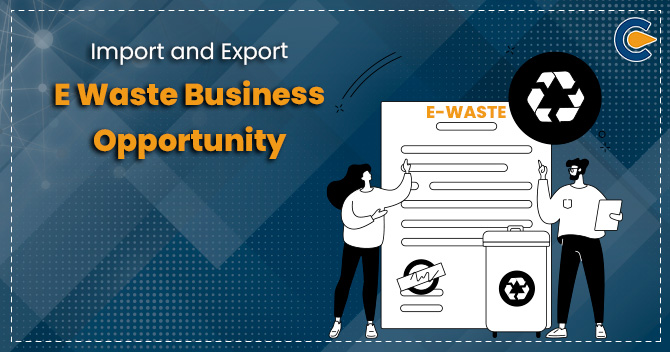The shift in the market economy and the introduction of new products have paved the way for many new and innovative enterprises that not only help in the growth of the country but also have a positive effect on the overall environment of the country. E-Waste business opportunity is one field that has helped in the generation of many new types of businesses, including PROs, import and export businesses etc.
Basel Convention on the Control of Transboundary Movements of Hazardous Wastes and their Disposal, which is the multilateral agreement negotiated under UNEP (the United Nations Environment Program), provides for International regulations for standards/guidelines of cross-boundary transport of hazardous waste or another type of waste including the norm of obtaining notice to and written confirmation from the country receiving the exported waste.
In India, this regulation on the Import and export of the E-waste is governed under E-Waste (Management) Rules, 2016. Under these rules, the provisions are provided for producers’, manufacturers, collection centres, and dealers etc., who are involved in the manufacture, sale, transfer, purchase, and collection and processing of E-Waste.
Importers and Exporters under E-Waste Management rules
Although the terms “Importers” and “Exporters” are not defined under E-Waste (Management) Rules, they can be understood under the definition “Producers” and “dealers”, which include the person who sells or buy the electrical and electronic equipment or their component or their spare parts.
Import of E-Waste
According to a 2020 assessment by the Centre for Science and Environment (CSE), electrical equipment accounts for 9.62 per cent of total imports. In the last six years, the Import of electrical and electronic equipment (EEE) has increased at a pace of 12.3% per year, with a negative growth rate in 2019–20.
Therefore E-Waste Management rules, 2016 dictate regulations regarding Import which include:-
- EEE (Electric and Electronic Equipment) will only be imported to the producers having EPR Certification and authorization that is permission given by CPCB (Central Pollution Control Board) as stipulated under Section 5(3) of the E-Waste Management Rules, 2016.
- Along with submitting the Application for EPR, the importers also have to submit the Extended Producers’ Responsibility action plan.
Documents accompanying the Application
- Extended Producers’ Responsibility Plan, which involves the policies adopted by the importer for channelization, collection and disposal of E-Waste generated by EEE Import
- Awareness Plan
- The amount the importer is planning to spend for the execution of waste management
- Compliance with the reduction of Hazardous Substances provisions.
Liabilities of the importers
Under clause 21 of the Rules, 2016, importers are held liable for any damage they have caused to the environment or any other party because of their mishandling and mismanagement by the importer. They may also be asked to pay a fine under E-Waste (Management) Rule, 2016.
Export of E-Waste
As per the data available, India has 90 E-Waste Scrap Export Shipments with around 15 suppliers mainly exported to Myanmar, Hong Kong and South Korea. The Export of E-Waste in India is governed by many different enforcing agencies like the Ministry of Environment, Forest and Climate Change, Central Pollution Control Board, State Pollution Control Board, Directorate General of Foreign Trade and Port Authority and customs Authorities under the Customs Act, 1964.
List of E-Waste that can be exported
Due to the high toxicity of E-Waste, the Exporters have to keep in mind before seizing the E-Waste business opportunity the approved list of E-Waste that can be exported. The E-Waste that can be exported are:-
- Waste Electrical and electronic assemblies or scrap.
- Used multifunction print and copying machines.
- Clean, uncontaminated metal scrap, including alloys, in bulk, finished form (sheet, plates, beams, rods etc.) of Antimony scrap – Beryllium scrap – Cadmium scrap – -Lead waste (excluding lead-acid batteries) – Selenium scrap – Tellurium scrap. Etc.
Documents required for setting up Export E-Waste Business Opportunity
The following are the documents needed for the issuance of the license for E-Waste Exportation –
- Permission Certificate / License from Ministry of Environment, Forest and Climate Change for export of E-Waste
- NOC from the Ministry of Environment, Forest and Climate Change
- Consent Letter from State Pollution Control Board under Air and Water Act.
Procedure for acquiring the license for Export of E-Waste
- For the export of E-Waste, the person needs to apply to the Ministry of Environment, Forest and Climate Change
- In order to acquire permission to export E-Waste, the applicant is required to show a physical presence of business in India
- Then they are required to obtain NOC from the Ministry of Environment, Forest and Climate Change and State Pollution Control Board.
- Following NOC, the exporter needs to get the prior consent/permission from the company where the waste is being exported, which is not only a condition in India but is also a regulation under International Convention.
- After receiving the permission, the consent will be forwarded from the Ministry of Environment, Forest and Climate Change[1] to the concerned state pollution Control Board as per the E-Waste (Management) Rules, 2016, along with the State pollution control board of the state where the port is situated and the port and customs authority which are required to ensure the compliance of the conditions of export permission.
- Before Exporting the E-Waste, the exporter needs to keep a couple of things in mind:
- No Export is done without prior consent from importing countries
- Form 6 (Movement Document) should accompany the shipment
- The records of the E-Waste should be maintained.
- The no-objection certificate or NOC granted by the Ministry of Environment, Forest and Climate Change remains valid till the validity of the Consent Certificate issued under the Air and Water Act by the state pollution Control Board, which may vary from state to state.
Conclusion
Although due to the large E-Waste production in India, import or dumping of E-Waste under Hazardous and Other Waste (Management and Transboundary Movement) Rules, 2016 is declared illegal, the E-Waste from developed countries is still imported into India under the pretence of refurbished and re-exportation second-hand goods. This becomes possible due to the lack of proper regulations and resources of the nodal body of excise, which have resulted in a staggering amount of E-Waste in India. As per the estimates of the Directorate General of Foreign Trade, the illegal Import of e-waste in the country stands at about 50,000 tonnes annually.
Therefore before taking advantage of Import and Export E-Waste Business opportunity, it is very important for the potential importer and exporters to keep in mind their environmental responsibility and regulations to avoid confusion and misinformation.
Read our Article:How to open e-waste business in Delhi











